#suffice to say it has been an educational evening!
Text


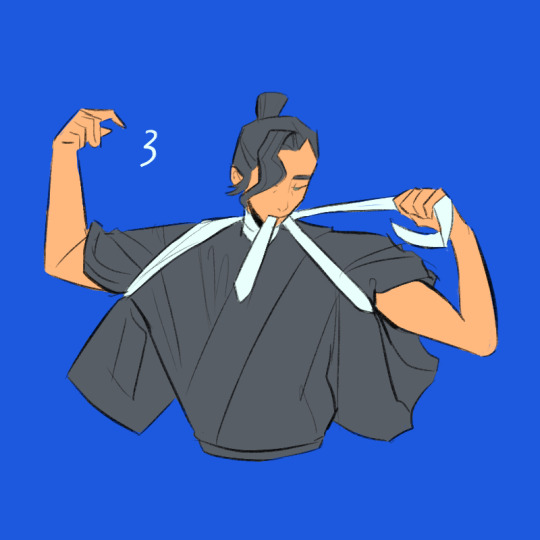
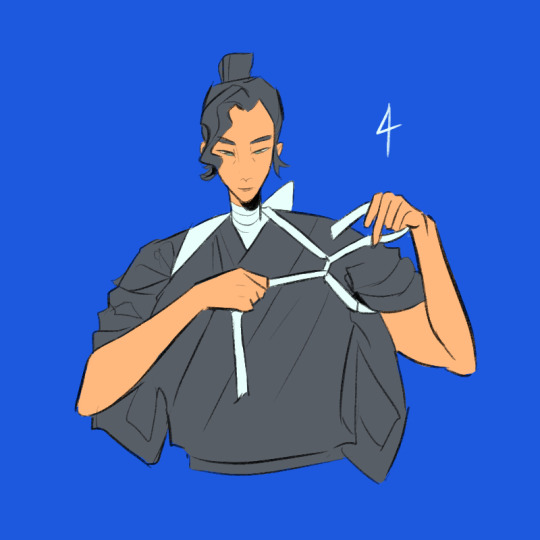
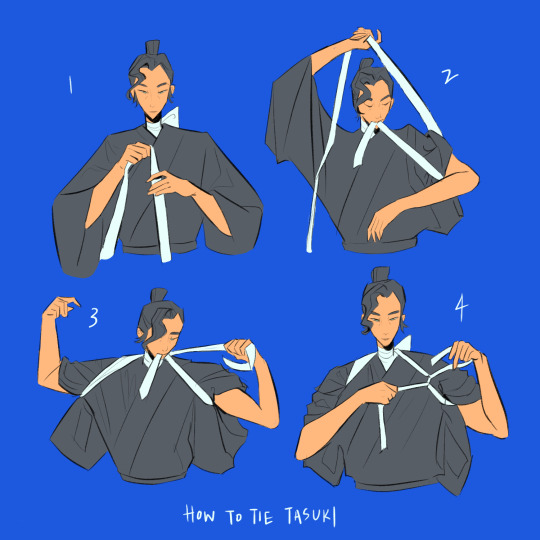
been obsessed with tasuki ever since reading hell's paradise, and so of course i had to draw mizu going through the motions. for educational purposes. of course.
I used this video as reference: https://youtu.be/qs6y2gOfQfI?si=c9qt9oC4jHlw-dYP
#blue eye samurai#mizu#fanart#suffice to say it has been an educational evening!#went a bit harder style wise on this#as you might glean from the ridiculous size of that curl#ikemen mizu?#more likely than you think#i think everyone has a very convenient break when mizu ties their tasuki#and while the body rests so must the eyes of course
2K notes
·
View notes
Text
Hypnosis and Dissociative Disorders
I've been meaning to write this since Charmed.
I shall not point fingers or name names but during Charmed 2024 there was a 101 class that taught that it was unsafe to play with those who dissociate as part of a mental illness. The graphic, which I'll paste below, used the word "Can't".
I wanted to speak to that.
Hypnosis has several different definitions. One could go to a hypnosis event and ask every presenter "define hypnosis in a single sentence" and get a different answer every class, likely a few may even contradict.
One such definition I could use is "Hypnosis is an altered state where a hypnotee is lead to a suggestible state where the hypnotee is dissociated from their conscious thinking." though one could say it is "an altered state that leads to breakdown in critical thinking and a heightened state of suggestibility" or you could start talking about the unconscious or subconscious mind.
Fact is, there's a lot of theory work at play and the language we use to shape the concepts isn't as important as understanding the concepts.
Dissociation is a natural part of hypnosis. It's also a natural part of existing. In much pre-talk patter we as hypnotists tend to ask an introduction level hypnotee to think about their experiences with time dilation, with highway hypnosis, with spacing out, with walking into a room and forgetting why you came in there.
Things so normal that as part of rapport, a hypnotist tends to assume the hypnotee can latch on to one of the concepts.
Dissociation is a spectrum. Literally. Within psychology the DES-II tool grades dissociation experiences on a scale, hence the acronym.
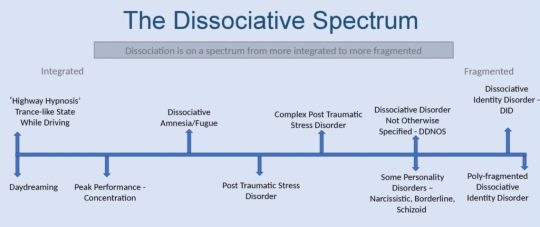
Graphic source
When people, including myself at times, describe dissociative disorders they tend to be referring to disorders that focus on dissociation as their main symptom. Depersonalization, Derealization and of course Dissociative Identity Disorder. Over the course of my life I have been diagnosed with all three.
But the scale includes Post Traumatic Stress Disorder, both complex and standard. Complex simply refers to a level of trauma that has been ongoing long enough that it is not a single memory or incident that triggers the symptoms.
According to the American Psychiatric Association one in eleven people will be diagnosed with PTSD at some point in their life with 3.5m diagnosed per year in the USA.
Which is to say that dissociating as part of an illness includes 8% of the population. Does that mean 8% of all potential hypnotees are too dangerous to play with?
...the answer is not a clear cut, "no". There is some elevated danger. But rather than teaching people not to play with those who live with these experiences, perhaps we can teach why there should be heightened caution and then allow people to navigate together.
We should always strive to educate and provide tools. When you tell a person they can't do something then they'll just do it without understanding why they aren't supposed to or, worse, predators will find those who were excluded from safer spaces. Harm is not reduced, an educator just gets to walk away from the harm with a simple "I said they shouldn't".
And plus, I said 8% of the general population...
Within hypnosis circles I assure you it is far higher when one factors in that multiple studies have supplied evidence that hypnotic susceptibility increases along with dissociative capacity.
Suffice to say, from utilizing hypnotic susceptibility tests (HGSHS) and dissociative tests (SDD and DES) the more a person dissociates, the more susceptible to hypnosis they are.
The human mind uses dissociation as a way of coping with physical and emotional pain, among other necessary inner needs, and so a person suffering from a mental illness that features dissociation becomes a naturally gifted hypnotee. It's a matter of practicing a skill constantly without realizing that they are refining something useful. Wax-On/Wax-Off.
This leads to a number of safety concerns. We've typed on serious concerns such as altering sense of identity and derealization attacks from lack of grounding. This is a topic near and dear to our heart as we acknowledge that we needed to gain an education in how to safely consent to hypnosis play and failing to do so in the past caused harm to ourselves and to those we played with.
So here's a list of potential dangers in playing with those who are further along the dissociative spectrum, how to mitigate those dangers and create a space where everyone can play safely.
I'll focus on hypnotees with dissociative experiences for the most part as the relationship between dissociation and hypnosis is primarily a concern while the hypnotee is in trance. That having been said I acknowledge that Dom Space connects just as much to the spectrum and an entire new post can be made on the topic of performing hypnosis when you have a dissociative disorder.
Heaven knows it is a topic I study feverishly to maintain safety for myself and those who entrust their mind to my care.
So... with that said, let's talk about the dangers.
Abreactions
This is likely the most common concept that comes up when thinking of the relationship between PTSD and hypnosis. An abreaction is the moment a hypnosis session or scene goes off the rails because the hypnotee is actively reacting to a trauma trigger while they are in a suggestible state. Their Fight/Flight/Freeze/Fawn impulse may be triggered and cause a physical or emotional reaction which was not part of the negotiated/planned scene.
This could be a cut and dry example of "and think about all the times you've been hypnotized right there on that sofa" causing a hypnotee to follow the suggestion and regress in memory to a time before a bad break-up when their former partner hypnotized them on the sofa they are currently on.
It could be an abstract example like "imagining yourself in a field of flowers and breathing in, noting how lovely the scent is, like the most beautiful perfume." causing sense memory to trigger the scent of a perfume that was in the air during a traumatic moment of their life that instantly flips the switch in their mind to go into F/F/F/F mode.
Likely any given hypnotist will experience this at some point in their life. The first example is one that any person could experience. Hypnosis naturally draws upon associations and when you create an association in the present to a negative emotion in the past you will summon it into the present.
With the second example, that association is already there and it was activated during the scene. The source of the abreaction. I avoid using the word "Trigger" both because of shitty internet discourse in the 2010s and because the term is used for other things in hypnosis, but that is what it is. A sense, a memory, an association which causes the source of trauma to intrude upon the present. The danger that the hypnotee experiences in these moments is very real.
Typically when I discuss these topics I put a disclaimer and emphasize how present the traumatic experience is. My hope is that anyone who is interested in hypnosis knows full well how true and powerful inner experiences are. If you doubt that then I sincerely do not know why you are in this community to begin with.
How to prevent an abreaction is important but should never be learned at the expense of learning how to handle an abreaction. Prevention is about disclosing during negotiation, asking the hypnotee to volunteer anything which may activate a negative reaction or simply what topics to avoid. Phobias are common enough examples of things that a hypnotist should know before working.
But disclosing every part of a trance or scene during the early phases of a hypnotic relationship is essential too. This way the hypnotee does not get surprised by anything propping up during play and they can measure their expected reactions before going into a suggestible state.
But if, despite caution, something does happen? What then?
Noting that every abreaction manifests specific to the person, their situation, their emotional state and how the scene caused it to happen. The first thing the hypnotist needs to do is not overreact. Over-correcting is an easy mistake to make in the moment but it will lead to an overall negative outcome.
Assess the situation and try to recognize what is happening. I had mentioned that the reflex is "Fight/Flight/Freeze/Fawn" this can be obvious like thrashing or ejecting out of trance instantly. It could be something harder to notice like locking up and becoming unresponsive or emotionally regressing to a terrified state.
If the hypnotee is still in trance then do your best to offer comfort and grounding. Remind them what is happening, remind them that they are safe, perform some grounding exercises such as box breathing (breathe in, hold, exhale for a number of seconds).
Touch is a case by case situation here. I know if I were having an emotional flashback to an assault then being touched would launch me further into abreaction territory. If you believe holding a hand would be beneficial then at the very least communicate it "I'm here, I'm going to take your hand, everything's safe, I'm here."
Over distance you should communicate this via modality. "I'm here, just listen to my voice, focus on the sounds in the room, I'm not going anywhere" for an audio example, "Just feel the blanket beneath you, you can brush your fingers against it if you need" for touch based.
The idea is to use emotional comfort, sensory grounding and patience to bring the hypnotee gently out of the moment.
Then apply aftercare and discuss what happened, what could be improved, what the hypnotee needs and acknowledge that the stress of these moments impacts the hypnotist too. Leave room for the hypnotist to recover as much as the hypnotee.
Decide together if this will end the session or not. Do not cut off on principal. If someone is conditioned to believe that displaying their negative reactions will lead to play stopping then they will hide those reactions. Accept that they happen. Learn how to grow together and incorporate care, comfort and safety into every scene.
Spontaneous Hypnotic Amnesia
One danger for those who suffer dissociative disorders is that their brains are very good at editing information. The further down the spectrum one is, the more adept their mind is at naturally pushing away things that they do not wish to think about nor have the capacity to integrate.
One categorization of dissociation is a failure for the brain to integrate information and experience. It is the cause of time dilation, it is why critical thinking is bypassed and it is why those further on the dissociative spectrum are able to compartmentalize their experiences so effortlessly that they can maintain dissociated personalities.
Where most people who practice hypnosis typically have to study how to achieve post-hypnotic amnesia, those who begin working with hypnosis with patholigized dissociative experiences may need to learn how not to experience it. I include this as I have spoken to multiple people who have lived this reality and it is something we ourselves experienced in the past.
Should a newer hypnotee show signs that they are not remembering what is happening during trance, it is a good practice to train them on how to retain information. Hypnotee Agency is a skill that one develops and allowing them the knowledge that they can chose to retain the information during a trance is as important as reinforcing how easy and normal it is to forget when that is a negotiated part of the scene.
All it takes to be safe here is to just remind them that if they wish to and find it enjoyable to do so, they may retain the information from this trance.
Nothing more complicated than that.
Derealization/Unreality
Derealization is a common experience within dissociation that is actually lower on the dissociative spectrum than PTSD. It is when you do not feel attached to your present experiences in real time.
A common version of this is "Deja Vu" which is a sensation where you are having difficulty integrating your present experience because it "feels" like you've already experienced it.
It can manifest in many other ways, however the commonality is that the person experiencing this knows that it's abnormal. When a person is disconnected from their surroundings like this they may experience a barrier between themselves and the world, they may have a distorted sense of time and they may become physically unresponsive and withdrawn.

Source: Mayo Clinic
The best way to handle this is to make sure that grounding always includes a thorough count-up that lets a person feel both in their body (this will help with depersonalization too) and aware of their surroundings. Ensuring both debriefing and aftercare focus on keeping reality in the room is important when someone's sense of what is real can drift.
For that reason it's a good idea to try and reinforce those ideas of what is real and save them in a little box that can be stored away if there are ever any reality altering suggestions in play, that way retrieving and unpacking that box can just be a natural part of the post-scene.
I linked it earlier, but my post on the topic can be found here.
Depersonalization/Altered States of Identity
Ah, our favorite soapbox.
Much like derealization, depersonalization is a symptom that is lower on the scale than PTSD and is actively invoked during inductions such as the Bandler which turns a handshake into the hypnotee starring at their hand and having the sensation of the hand distanced from their mind. Literally dissociating the hand from your body and using that sensation to build a trance.
It's a good induction. All forms of dissociation are not bad things. That is something I want to make sure an audience fully understands. This post is here to destigmatize, particularly when a 101 class was teaching stigma.
Depersonalization is a disconnection from one's sense of self. These are the moments when one feels like they are not the ones living through a moment, they are experiencing themselves from an outside perspective.
Once again, things that are utilized heavily in induction patter.
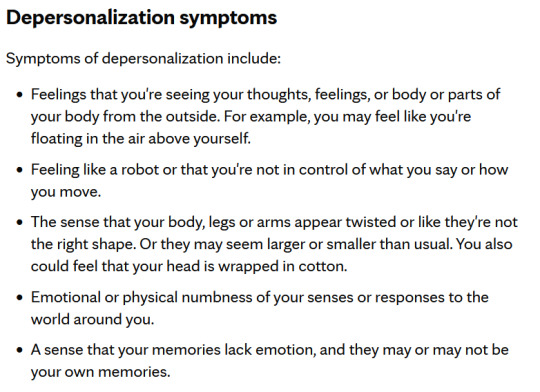
Source: Mayo Clinic
The derealization advice works well in this case, particularly the idea of creating a "back-up" to restore carefully at the end of a scene.
The big difference though is that depersonalization as a natural thing that those with dissociative disorders do can lead to some bleed when doing suggestions which alter a person's sense of self. I highly recommend an optional suggestion or affirmation that can help a hypnotee ground themselves. That may be too close to therapy for many though.
The hard part about being safe with depersonalization symptoms is that they are typically things that we actively engage with during hypnosis. I guarantee at least one person read "Feeling like a robot or that you're not in control of what you say or how you move." and thought of that as an absolute win.
This is where a bit of negotiation and hypnotee agency comes into play. Reality needs to be kept in the room during all hypnosis. Diving into ego-death or erasing reality may be tempting, especially for those who aren't particularly fond of reality or themselves, but it is too dangerous to surrender those things.
My definitive post on the topic has more information.
Though while I'm talking about altered personalities, I want to make something clear which I did not type about much in my Personality Play post...
Plurality
This is a topic on its own which could take on an entire post to itself. I may yet write it. If anyone has read our Madison and Belladonna stories they would know that they are written entirely based upon the life lessons Daja and I have been learning while I began therapy and was diagnosed with Dissociative Identity Disorder. Many of my lessons for how to safely play with plural systems are mixed in with the fiction.
When I say Plural I mean to refer to those who have multiple dissociated personalities, along with circumstances such as dissociative barriers.
There are as many displays of plurality as there are people who experience it. Every system is different. No two people are not on fire (awww).
So with that said, any play on either side of the watch is going to be lead with self-advocating. A hypnotic relationship involving a system (or more than one, even) will need a level of disclosure. Not just that a system exists but how that system manifests. What patterns are known regarding switches, what best works when an unexpected switch occurs, what levels of dissociative barriers exist between alters/parts, what terminology is preferred...
Wait, that's a lot to throw at once.
Our version of plurality is based upon Dissociative Identity Disorder. Which is to say that my system, originating via complex PTSD during childhood, used to have firm dissociative barriers between one another. This meant that, prior to diagnosis, you could have an emotionally charged conversation with me, Dawn, and then the next day Cammie will wake up and depending on the level of dissociation (typically but not always linked to stress or proximity to trauma triggers) will either not remember what happened during that conversation or will not carry the emotions that I had experienced. "Not remembering" can simply be "won't think about"
As I said, it's quite subjective. But the conceit is that with those on the DID spectrum will have a complete disconnect between parts/alters.
For those with less dissociation, but still experience plurality, they may not have amnesia or barriers between parts, allowing themselves to communicate with one another actively.
Within psychological communities there is eternal debate on all of these experiences and one of the more poignant debates is that the difference between DID and OSDD seems to just be a level of severity and that treatment and therapy tactics tend to move DID patients into the OSDD box and so they shouldn't be labeled as separate disorders.
These rules on amnesia, inner communication and emotional consistency between parts typically apply outside of disorders. I do not wish to engage in syscourse. But as above when I mentioned abreactions, those who practice with hypnosis know how capable a mind is to create hypnotically induced personalities. There are experiences outside of the DSM-V and that really shouldn't be a controversial statement.
A switch is when one part/alter trades out for another. The reasons are hyper specific to every system and cannot really be predicted without knowing their circumstances intimately. For instance the scent of lavender will draw me out without fail.
These can happen without warning and during hypnosis. Being cautious about body language, tone of voice and sudden changes in mood are the best you can do without guidance from the one with lived experience.
I'd also cautiously warn to end a scene and check in if there is an unexpected switch and there's no negotiated playbook on what to do in case of a switch.
The first Madison and Belladonna story tells the story of that very circumstance because that happened in my real life.
For safety it is best to try and communicate with the entire system over how to approach any aspect of hypnosis play. Exploring is a collaborative action and it can be a rewarding experience to find what works and what doesn't work. But it does take time.
For some basic "until I know better" rules, I'd say NEVER FORCE A SWITCH is a fairly basic rule, though. Also do not assume consent for a specific part/alter counts as consent for the whole system.
There is so much to say on this topic and I will likely revisit it at another point, but much of the safety tied up with DID and identity based dissociative disorders boils down to the fact that you are negotiating consent for a group and that you cannot always guarantee that the hypnotee at the start of a scene will always be present during the entire scene.
To that, I say treat switches like an abreaction, display acceptance and curiosity and don't get too hung up on the circumstances.
At the end of the day plural folx are just people too, just not person.
So... why did I write all this, anyway?
A lovely friend of mine recently joked that Charmed 2024 was the "Year of Plurality" and in a way they were right. I've been attending the event since 2020 and where my first had been a humble little class of 8 or so people on a Sunday afternoon ran by Vulpes Automata (Vulpes teaches the same class at Plural Positivity, albeit without the hypnosis content, a recording is hosted here) this year's event included many systems declaring themselves as such on their badge, both an in-person and online unconference that stretched beyond the time limits put in place and were feverishly well attended.
It has done my heart so good to see the safety and community growing and becoming more accepting.
It reminds me of the community's slow growth to accepting and embracing the transgender community in the mid-2010s.
Which is why I wish to be firm about trying to stop bad ideas from taking root in how we teach on these topics.
Some may remember that in the 2000s, respectable resources teaching hypnokink used to state firmly to "confirm biological sex" with any potential play partner. Said material has been revised. Times change and communities grow.
So when I see this teaching graphic saying that those who dissociate as part of a mental illness "Can't" be hypnotized, due to safety concerns? I get worried.
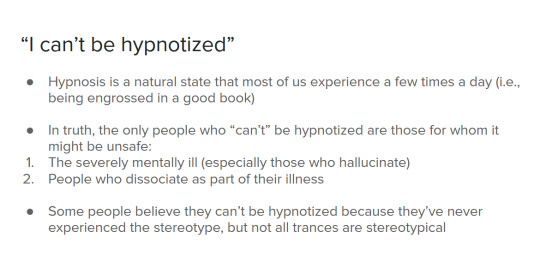
It was being used in a 101 class at the very same Charmed event that I am praising for having such good acceptance of plural experiences?
I lived this once as a closeted transgender woman. I don't want to live it again with our DID.
And I remember that "never play with anyone who has a mental illness" used to be taught in the same resources that once said to disclose one's "biological sex". People have taught this in classes and been approached by someone who had a mental illness and told how ignorant it was to teach that they could not be played with.
We, as a community, can do better.
I'd rather a 3 hour 101 become a 4 hour 101 and teach this material than to dismiss those who are the most vulnerable and susceptible and have them seek their trances from those who do not have reservations about safety and ethics.
Thank you for reading. I know this was a big soap box.
#dawn posting#hypnokink#hypnosis#hypnokink writings#charmed 2024#did#bpd#community resources#community safety
337 notes
·
View notes
Text
BSD Characters Catch You Reading Smut

No one asked for this, but I just had the idea floating around in my head and it was too good to pass up. <3
Characters: Edogawa Ranpo, Akutagawa Ryuunosuke, Dazai Osamu, Kunikida Doppo, Yosano Akiko, Nakahara Chuuya, Fyodor Dostoevsky
Contents: smut references

Edogawa Ranpo
It doesn't matter how good you think your poker face is. Ranpo knows. You've spent years training yourself by reading fanfiction in public and using an e-reader to mask what you're doing, but there will always be a tell.
He pops his lollipop out of his mouth and smirks over at you from his desk while you're trying to read a few pages on your lunch break.
"Whatcha readin'?" he asks, coy.
You take a moment to compose yourself, pulling your gaze away from the scintillating, graphic descriptions written in the text, and glance across at him. There’s something about his smile that makes you unaccountably nervous. Ranpo might act like a kid most of the time, but there’s a hint of knowing in his eyes that forcibly reminds you this man is a full grown adult, and far too perceptive for his—and your—own good.
“A…uh…romance novel.”
Perhaps if you confess to something mild like reading romance novels at work, then he won’t go after the big fish. But you know as soon as the words leave your mouth that it’s a mistake. Ranpo always goes after the big fish, not the small fry.
“Uh-huuuh.” He draws out the word, grinning at you, one green eye opens a sliver. “Good sex scene?”
Across the office, Kunikida spits out his coffee over his paperwork.
Akutagawa Ryuunosuke
As much as Akutagawa talks like a Victorian orphan and likes to collect antiques, we don’t know much about his reading tastes, if he has any at all. Don’t forget he grew up in the slums, so he’s had little education, if any, before coming to the Port Mafia. After which, it was probably left up to Dazai, god forbid.
Suffice it to say that if he does enjoy reading anything, it’s probably morbid Gothic horror, riddled with existential dread and people dying young, haunted by the ghosts of their misdeeds. So, Poe’s stuff, basically.
All this is to preface the fact that I don’t think Akutagawa even realises there is such a thing as smut novels. He’s probably aware of porn, but dirty writing? Not something he’s ever bothered to consider in his relatively narrow purview.
He doesn’t really think twice when he sees you reading, since it’s a familiar-enough sight. It might be a book in your hands or just some text you’re scrolling through on your phone. It’s only when he notices your rapt attention to the text that he starts to get curious.
You’re so engrossed you don’t notice him loom over your shoulder until you hear his breath catch, a cough spluttering in his throat.
“What…what are you reading!?” he demands to know, rearing back from the book like it’s going to bite him.
Dazai Osamu
Oh god.
It’s very hard to hide anything from Dazai, but you’ve been trying to keep your spicy book collection a secret because once he finds out about something he becomes an incorrigible tease about it, and this would be no different.
You’ve almost mastered the art of hiding your fanfiction tab when he walks past by using the old (ALT + TAB) manoeuvre, Or by flipping to an innocuous part of your book when he walks into the room, but this strategy has backfired. Because Dazai sees all and knows all, and the sneaky little bastard has noticed your shifty behaviour. He’s been watching for a while, waiting for his moment to pounce.
So there you are, innocently reading your not-so-innocent novel on the couch, perhaps even on a break at the office, and suddenly there’s a presence behind you, warm breath against your ear.
“‘Her legs quivered like a newborn foal’s,’” Dazai narrates, his voice breathy. “‘Lord Fondezglimmer’s hands brushed up the insides of her thighs, her skin as soft as flower petals, reaching for—’”
You snap the book shut. “Shut up, shut up!”
Dazai is unrepentant. Even as you get up, he follows you around the room, hand over his heart, eyes glittering, repeating the scene word for word.
“‘Primrose’s secret flower was his to taste! As he lay her down upon the bed of handwoven silk, her kirtle rose to her hips to reveal—!’”
“Shut up, Dazai!”
Kunikida Doppo
The main book Kunikida is interested in is his notebook. He does, however, have a list of well-lauded self-help books, memoirs, and other edifying literary works that he intends to check out just as soon as he has the time. He admires you, actually, and how much time you devote to improving your mind through reading. He occasionally goes so far as to ask you for recommendations, and you have to scramble to recommend something that won’t make his glasses shatter in shock.
Little does he know what you’re really up to.
It’s only when he finds himself at a rare loose end that he finally makes his way over to your bookcase and leafs through some of the volumes. He goes for the last one he saw you reading. It seems innocuous. The cover is a pastel purple with swirly writing. A romantic saga of some sort? Well, he can indulge a chapter or two, just to see what you’re interested in.
Ten minutes later, Kunikida is sitting on the edge of his seat, gripping the book so hard it looks like he’s about to tear it in half. His face is scarlet behind his glasses, his eyes hidden by the glare on the lenses. His hair is practically standing on end. By the time you find him, he’s as wooden as a statue.
“Ah, got curious, did you?” you ask, amused.
“...this is…” Kunikida starts. “It’s…”
“Erotica,” you inform him, tugging the book from his nerveless hands. “Poor thing. If you were curious I could have given you something a little softer to ease yourself in.”
“No! I’m good. Thank you very much. I’ve seen…quite enough.”
He’s lying.
Yosano Akiko
Fairly sure that most of Yosano’s books are either medical textbooks or lurid true crime memoirs, complete with grisly photos of murder scenes and autopsies. She reads and rereads those until the covers are falling apart. She probably also reads thrillers and a little bit of horror. Like the Dexter novels, though she scoffs at the implausibility of some of the murders and gore.
Naturally, when she sees you curled up on the couch, your nose buried in a book, she wants to know what it’s about. It doesn’t matter how discreet the cover is, or if you’re reading on your phone/tablet, because she’ll just plop down and start asking you questions, or pause to read over your shoulder.
“What are you reading, you little pervert?” she asks, leaning on your shoulder.
Her commentary is lowkey hilarious.
“Oh, my~” she teases, before leaning and reading further. “...that’s not biologically possible, but still the concept is kinda hot.”
“Anything more than like eight inches isn’t going to fit inside, you know that right?”
“Ooh, he’s choking her? Turn to the next page. What? No, I won’t go find my own filth to read.”
She does borrow a few of your titles, though her tastes always trend towards darker romance.
Nakahara Chuuya
As much as I love Chuuya, he doesn’t strike me as the type to spend all his time sitting around reading lofty tomes of high-brow literature. He’s a live-in-the-moment kind of guy. While he might pick up the odd book on the recommendation of people whose taste he likes, he enjoys poetry more, or short, punchy novels. If a book you enjoyed gets turned into a movie, he’ll go see it with ya.
Thus, he’s never been introduced to the secret world of spicy novels, from the softcore porn of the 1980s to the roaring trade of indie authors putting out entire sagas of smut today. Totally clueless. Didn’t even realise it was a thing, honestly. His idea of a romance novel is one with a woman in a fancy dress and a shirtless man on the cover, where the scene fades to black before they do it.
Poor, innocent Chuuya.
He just thinks you look cute and cosy when you’re all snuggled up with your books. It doesn’t cross his mind to wonder what you’re reading unless you laugh aloud or gasp or something. Imagine his surprise when he glances your way one day and words jump out at him from the page. Dirty words. And when they’re strung together, the context is even smuttier. He grabs the book from your unsuspecting hands and holds it over your head (or floats it if you’re taller than him, lmao.)
“Whatcha readin’, you little pervert?” he asks, a grin growing on his face.
“Give it back!”
“Nah, don’t think I will. Is this what you’re readin’ all the time?” He flips through the book, whistling. “Damn, you’re a dirty little thing, aren’t ya?”
Fyodor Dostoevsky
If you think Fyodor somehow doesn’t already know everything you purchase and everything you browse online, then you are a sweet, innocent creature and should be protected from all that is evil and unjust in the world.
But let’s say you’re a little sneak and somehow manage to get your hands on some spicy books without your dearest darling Fedya knowing. You can certainly read them in the long hours that he is away working and perhaps even find a way to store them discreetly on the bookshelf.
(I doubt you’d be forbidden to read those kinds of books, but it’s still a little embarrassing for you and you might prefer your smirking husband didn’t know about it.)
Ah, but you can only keep secrets from him for so long. One day he abruptly appears behind you. You didn’t expect him home so early, didn’t even know he was coming in, but then there’s just a pale hand reaching over your shoulder to stop you turning the page, and a low, accented voice in your ear.
“Not yet, my darling. I’m not done with this page.”
You yelp, flinging the book across the room, and Fyodor stands up, smiling down at you. He tuts at your treatment of the book, picking it up and dusting it off before he turns it over to look at the cover. His smirk is practically feline, satisfied and amused in equal measure.
“My, my, myshka~ I had no idea that this is what excites you so much.”
#yokohamapound#bungou stray dogs#bsd#edogawa ranpo#akutagawa ryuunosuke#dazai osamu#kunikida doppo#yosano akiko#nakahara chuuya#fyodor dostoevsky bsd#bsd smut
805 notes
·
View notes
Text
The Gish Gallop was a term coined I think on the 2000s internet for a rhetorical maneuver where to buttress an argument you provide a ton of low-quality evidence; that the evidence is bad means it should be easy to refute, but the very large volume means it will take much longer to explain why it's all wrong than it did to copy-paste a bunch of links, and to a certain kind of very naive onlooker, it looks like the galloper is winning--after all, the one interlocutor has presented a ton of evidence! The second interlocutor has to spend so much time bending over backwards to refute it! Surely the first guy is more knowledgeable and authoritative. You aren't going to look at all that evidence yourself, of course--who has the time?
But listening to Dan McClellan talk about the Gospel of John this morning, it occurs to me that I don't think this is disingenuous. Not entirely. I think this is just the style of argumentation a lot of Christians (of a particular religious flavor) are used to. And I'm not just talking about in non- or para-religious matters like evolution. This is how Christianity understands the Bible.
This week's Data over Dogma is about the theology of John, and why it is non-trinitarian (because the Trinity is a much later doctrine developed as a kind of political compromise, maintained only because it had state backing) and does not actually identify Jesus with God (the theological developments are more complicated here; but suffice it to say it was not at all a given that "authorized bearer of the divine name" and "actually God" were the same being in 1st century Hellenistic Judaism, and indeed the distinction between the two had developed in Jewish thought precisely to avoid the awkwardness of anthropomorphic figures proclaiming themselves God in some of the older sections of the Hebrew Bible).
The funny thing is, there are a ton of passages in John that get trotted out as proof texts that Jesus is God. There are very good reasons in the case of each one to doubt that that is actually the correct reading; but of course, if you don't know anything about Greek, all you have are modern translations produced under the assumption of the dogma of the Trinity--mostly for devotional readers of the Bible who would be outraged if the Trinity wasn't in the New Testament--and you have been raised in a cultural and/or educational milieu where it is simply a default assumption about the way the world works that the Trinity is a timeless concept that has been in the Bible from the beginning, it sure looks like one side is spinning up tendentious arguments based on silly semantics that have nothing to do with the religion you learned as a kid.
But this exegetical approach (really, eisegetical) is common to many topics in traditional Christian theology. There are a ton of passages from the Septuagint that the Gospels warp to be about Jesus, even though, in their original context, this doesn't make any sense; sometimes even they're based on obvious mistranslations, like having Jesus ride into Jerusalem on the back of two animals simultaneously because you don't understand appositives. And you can poke holes in any individual bit of this exegesis, but psychologically having a ton of low-quality evidence for a thing is a pretty effective bulwark against thinking critically about that evidence; for every individual argument you knock down, the person you are arguing against is probably thinking, "yeah, but what about all that other stuff," even if they can't actually name all that other stuff in the moment.
And it's not mendacious! This is the stuff of true belief; this is how you get breathless Christian commentators saying the Bible couldn't possibly be written by human hands, because it so perfectly predicted Jesus even in the Old Testament--and the evidence they point to is, to anyone not steeped in traditional Christian exegesis, and especially to Jews who have their own exegetical traditions, absolutely barmy. Like really pants-on-head crazy stuff. But of course even now it is still being processed, in many parts of the world, through a two thousand year old tradition trying to reconcile it all and to normalize it all, and--to bring it back to discussions of evolution on the internet in the 2000s--I can't help but think of all those people who talk about the experience of thinking evolution was so obviously nonsense, because all they were exposed to was the fundamentalist strawman of it. When they finally sat down and began to read about it on their own, from unbiased sources--often with the intent of criticizing it--they realized how distorted their understanding was, and how limited their supposed outside view.
(If there are general lessons to be wrung from this situation, I think it's simply "beware of echo chambers." Social consensus in a bubble can make bad arguments feel much stronger than they really are, especially if you are not exposed to the actual opposing view. Be on guard against mistaking "quantity of evidence" for "quality of argument," especially if you're not gonna evaluate that evidence yourself. Also all religious traditions are fundamentally eisegetical, because in order to keep holy writ relevant to the community its meaning has to be constantly renegotiated. So, uh. If you want high-quality exegesis, ask an academic, not a theologian.)
89 notes
·
View notes
Text
Was Jesus transgender?

Jay Hulme has written a fascinating thread about how theologians have understood the gender of Jesus. Even though no one thinks of Jesus as transgender in the modern sense, it is pretty clear that Jesus has been seen as crossing the gender binary.
Jay Hulme is a transgender poet, performer and education and you can find his web site here! Jay is currently Poet-in-Residence at ‘The Poet’s Church’, St Giles-in-the-Fields in Central London.

Recently there was some drama where news outlets got angry at a sermon which supposedly claimed Jesus was trans. Obviously the sermon did not say Jesus was trans - but it did touch on some fascinating (and very old) theology surrounding Jesus and gender. So let's talk about that.
God is not male
First I've gotta explain the Trinity... which is way too complex for twitter Suffice to say that God is not male (despite what you may have heard) and is in fact all genders and none simultaneously Jesus is God made flesh, God embodied as human. As a human man, yes, but also...
If you've been on Trans Twitter you'll have seen the "Jesus is trans" jokes. Saying his chromosomes had to be XX because he couldn't have got a Y from his Father. The meme about his side would being from top surgery But people have been playing with Jesus' gender for centuries
And the reason that people have been playing with Jesus' gender in art and theology and all that for centuries, is that Jesus gives us REASON to. So, of course, as we expand our understanding of gender in the modern world, we expand that to trans stuff too.
For all mankind
So lets talk about how, historically, the "Masculinity" of Jesus has been seen and considered, shall we?
So the whole point of Jesus is that he comes for ALL of humankind. We are told that we are all capable of, and supposed to work towards, being "christlike" - after all, Jesus is the embodiment of a genderless (or genderfull) God. The point is not that Jesus is a man, but a HUMAN.
And Jesus is clear about the fact that he didn't come as "a man" but "a human". So clear that all of the Gospel writers agree on it. In fact, throughout the Gospels Jesus never uses the word "anēr" (male/masculine) to describe himself. He always uses "anthrōpos" (human).
Jesus is the human incarnation of a God who is all genders and none, all at the same time; a God that has created each of us in their own image - all of us, of every gender - and therefore Jesus is not simply "male", but "human", and theologians have long recognised this.
Jesus as mother
Understanding that Jesus isn't merely "male", theologians have often described Jesus as a "mother" - most famously Julian of Norwich, who wrote in the 1300's, said: "Jesus Christ therefore, who himself overcame evil with good, is our true Mother."
Julian of Norwich also stated "The mother can give her child to suck of her milk, but our precious Mother Jesus can feed us with himself, and does, most courteously and most tenderly, with the blessed sacrament, which is the precious food of true life"
This idea of the sacrament as breast milk was not unique to Julian - many theologians drew the connection between these life giving things - even reflecting Rabbinic understandings of the Manna from Heaven as breast milk to create a long thread of understanding.
But one of the most "contentious" parts of the sermon that started this furore and started this thread is a particular (and long held) understanding of Jesus' side wound. Obviously, Julian has thoughts on that, too...
Julian says: "The mother can lay her child tenderly to her breast, but our tender Mother Jesus can lead us easily into his blessed breast through his sweet open side, and show us there a part of the godhead and of the joys of heaven, with inner certainty of endless bliss."
Jesus side wound
Medieval Christians were OBSESSED with Jesus' side wound. It was the highlight of artistic depictions, the focus of sermons, the content of visions. And one of the main things they saw it as, was some kind of portal...
And by "portal", I do, of course, mean vagina. And that's what the oh so contentious sermon said - "look, medieval christian art saw Jesus' side wound as a vagina. Let's talk about that."
The idea is that Jesus gives life. Like a mother giving birth. Jesus raising Lazarus from the tomb, Jesus himself rising from the tomb, they both involve the miraculous drawing out of human life from a dark cave, along a tunnel, and into the light. Sounds a lot like childbirth.
We say that Christ died so that we could live. The Bible says it a lot. Many theologians, living in a time where death in childbirth was common, and childbirth itself could be horrifically painful drew the connection between Christ's physical death on the cross and childbirth.
Theologians saw Jesus' agony on the cross as a form of 'labour' as he 'birthed' new life for all of us. And so, when the soldier pieced his side, proving he was dead, and "blood and water" came out, they saw that as the moment of 'birth'. Like blood and water come in childbirth
With that in mind, when an opening in a body brings forth water and blood, and in the midst of that water and blood comes new life... it's fair to think of it as a vagina. So medieval artists, depicting that moment, depicted Jesus' side wound as such. It was a thing.




The femininity of Jesus
There's also all the theology that surrounded Jesus' actions: theologians living in times of strict gender roles obsessed over the "femininity" of Jesus feeding and serving others. Even speaking to women as if they were equal. Of him taking the "feminine role" in his interactions
But this thread is already very long...
In summary: If you think it's heresy to see Jesus as "feminine" or "mother" or anything other than a masculine macho manly man, you're wrong. And if you think it's "modern woke nonsense", then you've not been paying attention to centuries of theology, or the Gospels themselves.
One day I'll do a whole thread on how it actually is Big Trans Vibes for God to shrink down to a single "gender" and body to walk among us as Jesus, and how weird that must have been for Jesus to suddenly be "male" and not "the genderweird vibe of God" but that's for another time
Ppl have been going BUT WHAT ABOUT 'THE SON OF MAN' and my friends, the earliest Gospels we've got are Ancient Greek and Luke 9:22 says "υἱός τοῦ ἀνθρώπου" υἱός is often translated as "male child" but regularly applies to female children ἀνθρώπου means "human / humanity"
Full twitter thread here!
Photo from the Norwegian play Jesus, the Queen of Heaven, where the Norwegian transgender pioneer Esben Esther Pirelli Benestad played Jesus. Photo by Fin Serck-Hanssen.
#trans#transgender#queer#lgbt#lgbtqa#jesus#theology#gender theology#christianity#essential#history#religion
735 notes
·
View notes
Text
1:30 pm
It’d been a few tiring months.
It took longer than you thought it would, to track down the special grade cursed object and even then, you were confronted with the curse users who didn’t want to hand it over peacefully.
Suffice to say, it took a while to convince them and they didn’t get out of it without some significant reminders.
You really wanted to head back to your apartment to freshen up but didn’t want to wait to handover the cursed object to where it could be safe. Which brought you to Tokyo jujutsu high, with a big suitcase and a bag, the inside of which was wrapped in talismans.
On second thought, you should have left the suitcase at home because you really didn’t want to lug it halfway across school to deliver a little parcel.
Rubbing your stiff shoulder, you brought out your phone to ask Yaga where he was. Before you could hit call, you were interrupted by a hesitant voice.
“Hello…?”
A young boy, with pretty pink hair and wide eyes looked at you, glancing between your bags and the phone outstretched in your hand. He must be a first year since you hadn’t seen him before and he was in uniform. Your mood further dampened on realising that you missed a month of your classes as the incharge of second years and your previous student’s promotion. Oh well, you were just going to have to bribe them with all the souvenirs you brought.
Realising the boy was waiting for you to say something, you give him a smile.
“Hello there! It’s nice to meet you.” You introduced yourself and the kid’s eyes lit up, knowing you weren’t someone who might have accidentally wandered in. It happened more often than one might expect.
“I’m Itadori Yuji, a first year!” His eyes fell onto your large suitcase. “Can I help you with that?”
Your heart warmed at his kind offer. Months of handling everything yourself, coming back tired to your hotel room and wishing the mission could just end, it was nice to be offered help. You smiled and nodded at him and Yuji was only too happy to be of help.
You chatted mindlessly with the boy as you made your way to Yaga’s office where he asked to see you.
“I’ve not met my seniors yet but I hope they’re nice too!”
“I’ve not met my students for this year either but I’m sure they are. Although, usually everyone who comes to me after Satoru has already given up on a normal education.” You laugh and Yuji’s eyes lit up.
“You know Gojo sensei? Wait, that’s stupid, of course you know him.” He blinked.
He then proceeded to ask how you knew him and multiple variations of that. You kept your answers vague, not knowing how much you should be telling Satoru’s students about his (and yours) personal life without talking to him first.
Before you knew it, you had reached in front of Yaga’s office, amidst talking and laughing with Yuji.
“Thank you for your help, Yuji. I really appreciate it.”
“It’s no trouble at all! I’m glad I could be of help.”
“I’ll treat you to a nice meal sometime. You can bring the other first years as well, it’d be nice to meet everyone.” You smiled and Yuji was already making plans in his head, and how he was going to tell his friends all about the pretty second year incharge.
A yell of your name had you and Yuji turning to see Gojo sauntering towards you with a wide smile on his face.
“If it isn’t my favourite special grade sorcerer!” He put an arm around your shoulder, tugging you close and Yuji’s mouth opened in astonishment. Gojo waved at his student before grabbing your suitcase and opening the door to Yaga’s office, pushing you inside.
You gave Yuji an exasperated look but the small smile on your face betrayed your fondness.
“See you later, Yuji!”
He could not wait to see his friends.
#gojo satoru x reader#gojo satoru#jujutsu kaisen#jjk#yuji itadori#jujutsu kaisen fanfic#jjk fanfic#jjk fanfiction
46 notes
·
View notes
Text
You Say Potato, I Say Excellent! Or blocking, dialogue and legacy of morality tales in ‘The Resurrectionists’ minisode PART I
Alternate title: how Aziraphale’s naivety in this episode was supposed to make you a bit outraged
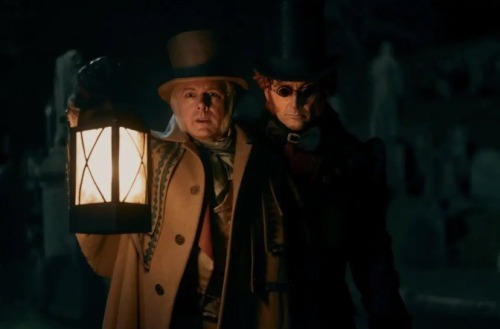
I have to shout out to @bowtiepastabitch for their AMAZING historical analysis of this minisode - it prompted me to finish this long ramble that has been drifting in my notes. Anyway, I have a major obsession with the ways blocking and dialogue interplay in Good Omens - you can check out my analysis of the blocking in the flashbacks in S1. But The Resurrectionists is really something special. This got so long I am splitting it into two parts. See Part II here!
I should start with three important caveats that brought me to this analysis -
If we accept that S1 is narrated by God, then I propose that S2 is being told from the viewpoint of our Ineffable Man Shaped Beings - and they are NOT reliable narrators.
All three minisodes share a feeling of being… stories. They feel like a slightly exaggerated version they might be told between two old friends sitting in the back room of a bookshop, soused off wine and whisky. Like a journal entry that you don’t actually expect outsiders to see.
All three minisodes have some relation, in style and structure, to film and literature. I'm focusing on the lit aspect here. A Companion to Owls is very illustrated bible. Nazi Zombies from Hell is a pulp fiction master class. So what is The Resurrectionists? A morality tale.
My first thought when we opened on the romantic graveyard date in Edinburgh was “OH it’s like a penny dreadful!” but it didn’t take me long to reassess. Morality tales are a genre of children’s literature that was extremely popular in the early 1800s where the minisode is taking place. But THIS morality tale itself is a more nuanced version of these stories, more along the lines of what an author important in the Good Omens universe would pen. So, first, a little bit of history behind morality tales and a very important author to know, then we get to the blocking and dialogue!
Morality Tales for Children
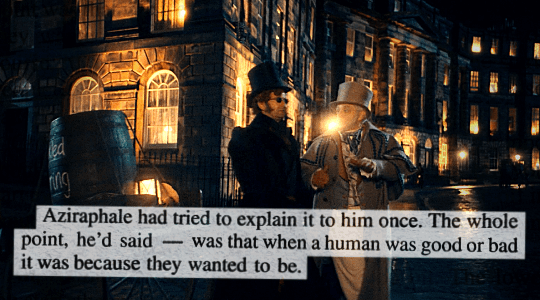
There had long been differing views in European circles of thought about the nature of children - were they born innately tainted by Original Sin, or were they born as blank slates? In the late 1700s to early 1800s, the view of the blank slate was winning with the help of highly influential educators like Friedrich Froebel (who coined the term kindergarten and emphasized the importance of play in learning.)
At this same time, there was a rise in literature produced specifically for children. One of the most popular children’s genres? The morality tale. These stories showed Good triumphing over Evil and the importance of leading a respectable, Christian life. The stories were extremely binary, black and white in their presentation of morality, something which deeply influenced many authors who were raised reading them. Authors like G.K. Chesterton.
G.K. Chesterton
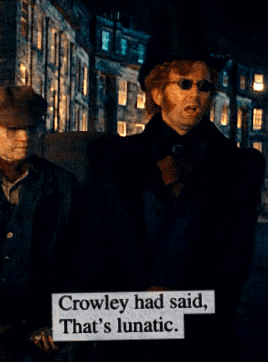
Over his career, Chesterton wrote several plays, 80 books, 200 short stories, 4,000 essays, and several hundred poems. He’s an interesting guy, but suffice to say for our purposes - he was deeply Christian, and his work contains a lot of religious themes and symbolism which he used to write serious commentary on politics, economics and philosophy. If you haven’t read the book, you should know that it the dedication reads thus:
The authors would like to join the demon Crowley in dedicating this book to the memory of G.K. Chesterton.
In fact, Crowley says in the book that Chesterton was “The only poet in the twentieth century to even come close to the Truth." So it is probably relevant that Chesterton had opinions about children’s morality tales. He once wrote -
Many people have wondered why it is that children's stories are so full of moralizing. The reason is perfectly simple: it is that children like moralizing more than anything else, and eat it up as if it were so much jam. The reason why we, who are grown up, dislike moralizing is equally clear: it is that we have discovered how much perversion and hypocrisy can be mixed with it; we have grown to dislike morality not because morality is moral, but because morality is so often immoral. But the child has never seen the virtues twisted into vices; the child does not know that men are not only bad from good motives, but also often good from bad motives. The child does not know that whereas the Jesuit may do evil that good may come, the man of the world often does good that evil may come.
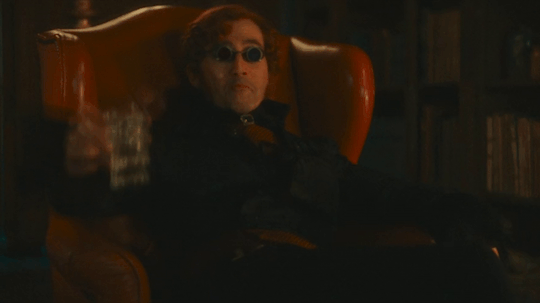
In summary, we know that children’s morality tales were supposed to teach important lessons about Good and Evil. We also know that later authors like G.K. Chesterton were aware of this genre and it influenced their writing (which in turn informs the Good Omens universe). So why pick this framework for this minisode? Because it is FRUSTRATING to watch, on purpose. We are meant to be annoyed with how Good has so little relation to right, to see how complicated doing real good can be, and it lays out a strong case for the complete inadequacy of black and white world views - and not just religious ones.
So (grabs gloves and a knife) let’s dissect the blocking and dialogue, shall we?
Part II: Blocking and Dialogue
#good omens#good omens meta#the resurrectionists#just theatre kid things#history is my jam#look the blocking has me feeling things#shades of gray
54 notes
·
View notes
Text
"When I first went to Jamaica in 2012 as a graduate student studying the environmental politics of the Maroons, an Afro-Indigenous community who freed themselves from enslavement in the 18th century and established an autonomous society in the mountainous interior of the island, Chinese overseas development policy seemed irrelevant to my work. Yet as my field research progressed over the following eight years, first as a doctoral student in African diaspora studies and then as a post-doctoral researcher, the impact of Chinese infrastructural development and extractive industry on the Jamaican people and environment became increasingly apparent.
The timing of my field work overlapped with an unprecedented surge in Chinese economic and diplomatic engagement with Jamaica and the Caribbean as a whole.
(...)
It is beyond the scope of this article to detail the political economic dynamics and immense social impact of debt in Jamaica over the last 40 years.4 Suffice it to say that the island became a byword for structural adjustment during this period, with every new loan from the World Bank, or default on payments thereof, coming with International Monetary Fund-mandated austerity.
Health and education were notable casualties of this socio-economic assault. By the start of my field research, Jamaican child mortality had almost doubled over the span of a single decade while completion of primary school dropped from 97% to 73% in the same period. This despite the fact that Jamaica had already repaid more money than it had been lent, with continuing debt servicing accounting for a 106% debt-to-GDP ratio according to the latest World Bank figures.
All this is only a small snapshot of the catastrophic outcomes of debt wielded as a tool of neocolonialism.
With the island’s status as one of the most indebted countries on the planet, Chinese infrastructural development was received with fanfare from Jamaican elites, a possible economic lifeline out of the debt trap.
(...)
Jamaican elites may appreciate that they can pay back debts with land, and that China does not directly require broad policy changes like the structural adjustment conditions of IMF and World Bank loans.
However, even with the above and the fact that the Jamaican debt to China is small compared to that claimed by Western IFIs and private firms, Jamaican politicians are growing increasingly wary of the costs of doing business with China. In November 2019, Prime Minister Andrew Holness announced that Jamaica would no longer borrow from China, a scant seven months after formally joining the BRI.
As usual, most Jamaicans are not privy to the inter-governmental discussions and deals driving these decisions, but their government’s newfound reticence in engaging with China reflects deeper concerns among BRI partners that the initiative is a debt trap.
(...)
Almost two decades of Chinese loans and infrastructure-led development have left Jamaican workers and farmers as precarious and dispossessed as ever. The hard-fought and generational struggle for Jamaican workers’ power (trade unions were instrumental to Jamaica’s independence struggle) has been curtailed and rolled back by China’s transposed sovereignty.
Furthermore, Chinese mining interests appear poised to pick up where their Western counterparts left off in terms of irreversible ecological destruction and threats to indigenous survival. Certainly, Jamaica cannot bear another 50 years of capitalist exploitation and extractive industry.
If there is any hope in turning this dire situation into revolutionary momentum, it will be in Jamaicans making common cause with the Chinese laborers imported to the country. According to China Labor Watch, Chinese workers on overseas BRI projects are often subject to “deceptive job ads, passport retention, wage withholding, physical violence and lack of contracts” to the extent of constituting forced labor and human trafficking.
In fact, at least one Chinese worker in Jamaica has already blown the whistle on such conditions. Unfortunately, as of the time of writing this article, there appears to be no organized effort to make solidaristic alliances among Jamaican workers, Chinese workers, and Maroons. The Maroons are organized as an indigenous community seeking land and sovereign rights, rather than workers seeking class emancipation, and remain locked in a fractious political battle with the Jamaican state toward those ends.
Furthermore, the cultural and language barriers between Jamaicans and imported Chinese workers are significant. Yet both countries have rich revolutionary traditions. If Jamaican labor militancy and Maroon struggle were able to reconcile and align their interests, while cultivating strategic allies among the heavily exploited Chinese workers, a powerful relationship of international solidarity from below could be forged."
...
39 notes
·
View notes
Text
So It's come to my attention that Phrenology and Physiognomy have made a comeback under the name of "Face Reading"
So my half conscious self has been dragged out of the abyss because I need you to understand why this is EXTREMELY BAD on so many levels. I'm gonna try and give you resources so you can educate yourself on the topic, but my brain isn't wording right today, so I'm sorry.
If you're younger, this is a part of the past you need to know because it's repeating itself now due to ignorance.
Phrenology and Physiognomy became super popular after Darwin's theory of evolution came out and bigots essentially used it to prove that they were "superior". People would do it for "fun" back then also, and the manuals that taught how to do it, or talked about it in depth can be kind of unsettling to look at due to the blatantly racist and antisemitic caricatures that you find in them. And we're not even going into how awful the texts can be.
I don't have enough brainpower at the moment to poke at that, but suffice to say, it's bad enough that the Nazis used physiognomy to push their agenda and murder millions during the holocaust. As well as take measurements of people during "Racial Examinations." These tests were used to supposedly determine if someone was Jewish or not, just take a look at these photos and keep in mind that if you didn't align to their "pure aryan" standards, you'd wind up persecuted and/or killed.:
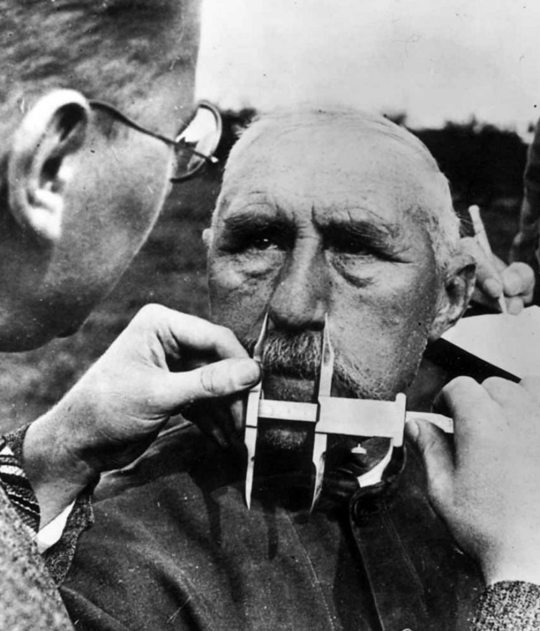

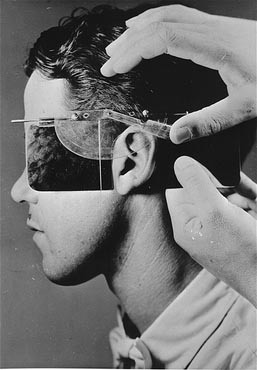
There's more photos out there than this, it's been heavily documented.
Anyways Face Reading/Physiognomy and Phrenology have always been used as racist propaganda. Don't do this or buy into it, please. It seems cute and harmless but it's not, not in the slightest, and just pushes more awful stereotypes out there.
This video talks more in depth about it than I can.:
youtube
I'm also posting more articles for further reading so as to educate yourselves on the topic. Keep in mind you will be seeing racist white supremacist propaganda and it can be unsettling.
Wikipedia Article on Physiognomy
History.com Article on the way Face Reading and Phrenology was used to basically assume some people were criminals.
Genome.gov article on Eugenics and Scientific Racism.
Penn Museum Article on Craniology in Race Science and Physical Anthropology
The United States Holocaust Museum article on Eugenics.
Scientific Racism Entry on Wikipedia
Nazi Eugenics Entry on Wikipedia
University of Missouri articles on the Origins of Eugenics.
A final word. Judging people based on their appearances never ends well, and in extreme situations leads to innocent people getting killed far more often than many of you realize due to racism, ableism, transphobia, and so on.
I'm no history expert, so these articles are all I can give you. If this can motivate you to start your journey to learning history so we don't repeat it, I've done my job.
Now I'm going back into the void, it's sleep time.
#history#eugenics#face reading#physiognomy#phrenology#racism#antisemitism#please learn your history so we don't have to do this again.#Youtube#tweedle talks
87 notes
·
View notes
Note
hiiii! I can ask for some hdcns for hajun, allen, kanata with an orphan mc fem who also has a younger sister whom she loves very affectionately and teaches (things like sums, reading, etc.) since they can't attend school je, well In summary, how would they react to a tender relationship between sisters~ (since we have seen several brother relationships in the anime, so I was wondering how things would be with a fluffy and sweet relationship between sisters with a lot of hug uvu) I hope I have explained myself well ;u; tell me if something was not understood and I will rephrase it again, tkm <33
┈➤ that's such a cute request! Hopefully, this will suffice for your scenarios, please enjoy!



Allen Sugasano
he notices you with a scratch paper you hold with. Allen was quick to take an interest in
Aware of the circumstances your life has been through he is sure to ask why you have that paper along with you. It didn't shrug the fact you said you want to teach your sister back at home today.
Allen wanted to help and the care and concern he shows he visiting you two at your house
It wasn't pretty much shabby nor abandoned as you mainly took care of everything around. Managing only you and your little sister, which Allen admires that of you
He sees your little sister at the front door directly she greets him before rushing you with a big hug
How cute isn't it? Allen was a bit cautious about wherever places he went, shy enough to bow as he walked inside
You prepared a small table with the scratch paper on your hands and placed it along with a notebook and a pen
"New lesson to teach her?" Allen asked as he watched you
You answered yes to the hip-hop genius with a soft smile showed your face. When your little sister arrives back to see you handling a new topic she has quipped her attention to you as you speak
Something Allen felt was genuinely unconditional that you wanted to help her know the bigger things and the outside world which he had a heartfelt weight on his chest. Chuckling as he also joined the discussion.
Wholesome moment when you put a lot of effort into telling your little sister what's good and bad, and there's nothing to be afraid of risking challenges in it too
You were a standing mother to her, she is more important to you than anyone else which Allen understands as he listens to you.
There are random conversations that relate to your new topic and yet rambles that your sister will find entertaining even in the slightest thought. Allen stares at you without any notice as you are focused on telling more about your sibling.
There are moments Allen grew fonder of your sibling relationship that he caters his time to talk with your little sister too.
He knows how hard it is to live up to the reality you've been facing. As Allen was supposed to leave, he chuckled and smiled at you saying "You know what? I think you'll be a great teacher someday. If I were to help you. I thank you for such a good role model for her."



Hajun Yeon
Such an observer, he would help you out about things with you and your little sister
But you were a persistent older sibling to her no matter what which Hajun respects
Something Hajun finds in someone that he wished to feel for throughout his past life with a rich family. Love wasn't something he saw nor felt within his presence before, until the picture of you and your littlbutister's bond
Hajun can only think and imagine how life was been for you to pursue just for this little lady. He sometimes assists you around when you need him. Education is a treasure that he believes in, despite the difference in his experience between the two of you. He wouldn't miss a chance to help out as well
Funny that sometimes Hajun would slide sarcastic comments about your teachings to your little sister which ends up with him and your sibling picking a tease on you. But who doesn't it? Hajun as his ways to do so
He feels like he is also part of this bond you two had. Even your little sister starts to call him "oppa" when he comes around visiting your place.
He makes sure to bring some books, papers, notebooks, and pens to find. He showers your little sister with gifts he knows she can appreciate.
Of course, you're not missing out. Hajun isn't the type to be verbal, but showing his side of effort and gifts are his ways.
Aside from that, it's a relief you're not the only one helping out to teach your little sibling. Hajun gives the best learnings for her to share as he was given the best education. So he wouldn't be shy about it.



Kanata Yatonokami
As Kanata relates to this kind of situation. He always reminds him and Nayuta in this case. He sees you with your little sister laughing as you discuss lots of things going on. The world outside is mysterious and something to explore.
He simply agrees with a few things you teach her, there are times when Kanata's words are full of direct bluntness which he says they should know as early as possible before they can step up the reality.
In hindsight of this relationship that you and your little sister had he couldn't deny thinking of Nayuta the way you take care of her. Every patience, every moment you worded for her about the things she should be grateful for and that she doesn't need to do for their living survival? Thus, other things you would do to sacrifice in order not to lose someone special, and a family? Kanata felt that.
You're like a mother to her the way Kanata stands up doing odd jobs for a living, a standing parent for their siblings. Finally, another one who can relate to his struggles
When you're out going to buy some new notebooks for your little sister which are mostly used for her random scribbles. Kanata simply talks to the kid randomly while you're away
Your little sister is just being a child of her own, scribbling on her notebook as she presents it to Kanata.
He blinked and laughed noticing this little kid drew him, "You're something huh?"
He never felt like this being close to someone and yet welcomed. Like how he and Nayuta only had each other, he could only hope that Nayuta was here with him. Pretty sure you'll be the only person Kanata understands more by how this situation is meant for you two to talk about.
As you go home by the time, Kanata is just talking to your sister as she still scribbles in her notebook. You noticed Kanata's doodle of him and your sister together playing. There's a note from your little sister that says "big brother" on her paper.
Chuckling aside, you excused Kanata to let your sister behave and they shall start their learning fun. Kanata is willing to stay for long as he sees what bond you two have.
He didn't find it boring when you talked about other things aside from how to write and read. You taught your little sister some basic math you know. Even kidding aside if Kanata knows something which he slyly ignores that you find adorable his reactions are.
Daily he goes to see you and your little sister having quality time together there are no instances that your bond with her reflects where he and Nayuta spend.
#anime and manga#lunaticcreatives =͟͟͞⚝#paradox live#paradox live the animation#paradox live headcanons#requests#allen sugasano#kanata yatonokami#hajun yeon
24 notes
·
View notes
Note
if you stopped writing, I believe I would cry. So, here’s another prompt. I would love, love, love to hear someone in the future (Discovery, SNW, TOS, TAS, TNG, DS9, Voyager, LD, Prodigy, Picard or anything else) absolutely swooning over Trip and T’Pol. So many bonus points if it’s set in your “Built to Last” universe.
Don't cry! ❣️❣️❣️
(hopefully this gets me bonus points lol)
Nog paced nervously in front of the console. “What if I don’t know enough?” he fretted. “Everything I’ve ever worked on has been primitive and out of date! I'll look backward compared to the other cadets!”
Miles O’Brien, in what one might be forgiven for viewing as his natural state – elbow deep in arcane Cardassian circuitry – didn’t look up. “It's not the newness of the technology that matters, Nog. Everything was cutting-edge once. It's whether or not you understand the mechanisms in front of you. That’s when an engineer proves himself. Have you ever heard of Trip Tucker?”
Nog stopped pacing, his face wrinkled into deep confusion. “What's a Trip Tucker?”
O’Brien chuckled. “Who. Captain Charles Tucker the Third. They called him Trip. He's somebody I think you'd find you have a lot in common with. First Chief Engineer of the very first Enterprise. Well, first starship Enterprise anyway. Back before the Federation was even founded, when Starfleet was Earth only.”
“That was centuries ago.”
“Yeah, it was. Back then, humans were the newcomers in the quadrant, way behind just about everybody else. It takes a lot of ingenuity to make up for being at a disadvantage. Hopefully your instructors at the Academy will tell you about some of the things he had to do to keep that ship flying.”
“What ship?” Lt. Commander Dax asked from the door. She carried a raktajino mug in each hand, placing one on the console in front of O’Brien. He nodded his thanks.
“Enterprise, NX-01,” he said.
“Oh, are we talking about Trip Tucker?”
“Has everybody heard about this guy but me?” Nog demanded.
“You know, I met him once,” Dax said. “Well, Tobin did. At an engineering conference on Earth, not long after the end of the Romulan War.”
“Really?” O'Brien looked fascinated. “What was he like?”
She looked thoughtful. “Funny,” she said. “And very genuine. And in hindsight, very good-looking, but Tobin was more interested in his plus one.” A fond little smile crossed her face. “She was the most beautiful woman I’d ever seen.”
“Who?” Nog asked, suddenly extremely invested in the story.
“His wife. Ambassador T’Pol.”
“Oh, that’s right!” O’Brien exclaimed. “He was one of the first humans to have an inter-species marriage. Officially, anyway.”
“So his wife was a Vulcan, and she was very attractive,” Nog said, wanting to get this thing back on track.
“She wasn’t just any Vulcan,” Dax said. “She was first officer on the NX-01 for years, she was the first non-human to ever receive a Starfleet commission… And after the founding of the Federation, she served as the ambassador to her homeworld for decades.”
She shot Nog a small smile. “But she was very attractive.” She sipped her drink, eyes on the past. “They really were a stunning couple. The energy between them was…palpable. Their sex life was probably spectacular.”
Nog's eyes were huge. O’Brien cleared his throat loudly, and Dax coughed primly. “Suffice it to say, they both had illustrious careers.”
“Here’s a homework assignment for you, Nog,” O’Brien said brightly. “Look up the Romulan Drone Ship incident of 2154. I think you'll find it educational.”
The young Ferengi nodded. “Romulan drone ship…2154…” he repeated.
“I want you to be able to tell me all about it tomorrow.”
“Oh! Okay! Yes, Chief!” He scurried off. O’Brien gave Dax an intrigued look.
“Spectacular, you say?”
“Chief,” she said frankly, “she probably owned a shirt that said 'Save a Starship, Ride an Engineer'.”
#thanks for the ask!#(as usual 😄)#fic#really not sure how to tag this one...#seriously if anyone has any ideas I'm open to suggestions!#star trek enterprise#star trek ds9#(I guess)
19 notes
·
View notes
Text
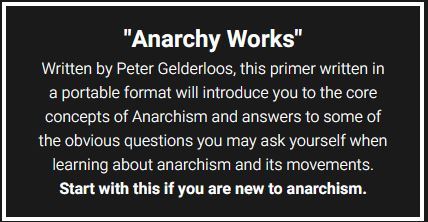
Chapter 1. Human Nature
A broader sense of self
A hundred years ago, Peter Kropotkin, the Russian geographer and anarchist theorist, published his revolutionary book, Mutual Aid, which argues that the tendency of people to help one another reciprocally, in a spirit of solidarity, was a greater factor in human evolution than competition. We can see cooperative behaviors similarly playing a role in the survival of many species of mammals, birds, fish, and insects. Still, the belief persists that humans are naturally selfish, competitive, warlike, and male-dominated. This belief is founded upon a misrepresentation of so-called primitive peoples as brutal, and of the state as a necessary, pacifying force.
Westerners who see themselves as the pinnacle of human evolution typically view hunter-gatherers and other stateless peoples as relics of the past, even if they are alive in the present. In doing so, they are presuming that history is an inevitable progression from less to more complex, and that Western civilization is more complex than other cultures. If history is organized into the Stone Age, Bronze Age, Iron Age, Industrial Age, Information Age, and so on, someone who does not use metal tools must still be living in the Stone Age, right? But it is eurocentric, to say the least, to assume that a hunter-gatherer who knows the uses of a thousand different plants is less sophisticated than an operator at a nuclear power plant who knows how to push a thousand different buttons but doesn’t know where his food comes from.
Capitalism may be capable of feats of production and distribution that have never been possible before, but at the same time this society is tragically unable to keep everyone fed and healthy, and has never existed without gross inequalities, oppression, and environmental devastation. One might argue that members of our society are socially stunted, if not outright primitive, when it comes to being able to cooperate and organize ourselves without authoritarian control.
A nuanced view of stateless societies shows them to have their own developed forms of social organization and their own complex histories, both of which contradict Western notions about “natural” human characteristics. The great diversity of human behaviors that are considered normal in different societies calls into question the very idea of human nature.
Our understanding of human nature directly influences what we expect of people. If humans are naturally selfish and competitive, we cannot expect to live in a cooperative society. When we see how differently other cultures have characterized human nature, we can recognize human nature as a cultural value, an idealized and normative mythology that justifies the way a society is organized. Western civilization devotes an immense amount of resources to social control, policing, and cultural production reinforcing capitalist values. The Western idea of human nature functions as a part of this social control, discouraging rebellion against authority. We are taught from childhood that without authority human life would descend into chaos.
This view of human nature was advanced by Hobbes and other European philosophers to explain the origins and purpose of the State; this marked a shift to scientific arguments at a time when divine arguments no longer sufficed. Hobbes and his contemporaries lacked the psychological, historical, archaeological, and ethnographic data that we have today, and their thinking was still heavily influenced by a legacy of Christian teachings. Even now that we have access to an abundance of information contradicting Christian cosmology and statist political science, the popular conception of human nature has not changed dramatically. Why are we still so miseducated? A second question answers the first: who controls education in our society? Nonetheless, anyone who counters the authoritarian dogma faces an uphill battle against the charge of “romanticism.”
But if human nature is not fixed, if it can encompass a wide range of possibilities, couldn’t we use a romantic dose of imagination in envisioning new possibilities? The acts of rebellion occurring within our society right now, from the Faslane Peace Camp to the Really Really Free Markets, contain the seeds of a peaceful and openhanded society. Popular responses to natural disasters such as Hurricane Katrina in New Orleans show that everyone has the potential to cooperate when the dominant social order is disrupted. These examples point the way to a broader sense of self — an understanding of human beings as creatures capable of a wide range of behaviors.
One might say selfishness is natural, in that people inevitably live according to their own desires and experiences. But egoism need not be competitive or dismissive of others. Our relationships extend far beyond our bodies and our minds — we live in communities, depend on ecosystems for food and water, and need friends, families, and lovers for our emotional health. Without institutionalized competition and exploitation, a person’s self-interest overlaps with the interests of her community and her environment. Seeing our relationships with our friends and nature as fundamental parts of ourselves expands our sense of connection with the world and our responsibility for it. It is not in our self-interest to be dominated by authorities, or to dominate others; in developing a broader sense of self, we can structure our lives and communities accordingly.
#anarchism#daily posts#communism#anti capitalist#anti capitalism#late stage capitalism#anarchy#anarchists#libraries#leftism#anarchy works
14 notes
·
View notes
Text
The first known written attestation of [Spanglish]—in Spanish rather than in English—in a setting that represents the quintessence of conflicting linguistic attitudes: Puerto Rico. The ambiguous status of Puerto Rico—at once a Spanish-speaking Latin American nation and a colony of the world’s most powerful English-speaking society—has provoked a level of concern about the purity of the Spanish language and an ambivalence towards the English language unmatched in the Spanish-speaking world.
The term spanglish (espanglish in Spanish) appears to have been coined by the Puerto Rican journalist Salvador Tio, in a newspaper column first published in 1952. Tio—who certainly considers himself the inventor of this word (an opinion largely shared by others in Latin America)—was concerned about what he felt to be the deterioration of Spanish in Puerto Rico under the onslaught of English words, and waged a campaign of polemical and satirical articles over more than half a century.
On the one hand Tio shared with many other Puerto Rican intellectuals of the time the fear that United States cultural imperialism and the crushing weight of English would eventually displace a language that had landed with Columbus and had survived unaltered until only a few decades previously. [Author then speaks of English-enforced schools and the first election of a Puerto Rican governor by Puerto Ricans]
Tio, like McKinstry and scores of nameless commentators before and since, deliberately invented pseudo-bilingual monstrosities into order to denigrate legitimate bilingual speech communities individually and collectively.
His harshest broadsides are directed at his fellow citizens for their failure to embrace monolinguism, for Tio a primordial virtue. Tio foreshadows a viewpoint that would later be taken up in the continental United States by expatriate intellectuals like the distinguished literary critic Roberto González Echeverría, namely that even educated Latinos willingly allow their language to be overrun by English in the mistaken view that this increases their upward social mobility.
I cannot explain the trash fire of 1970s-early 2000s discourse about the contamination of Spanish in PR that the author is referring to. Suffice to say that when the government shifted every four years to the party that favored a pseudo-independence, they would take English-language learning from public schools. I pretty much grew up with the idea that my Spanish was bad (because I spoke a lot of English) and once had teachers tell me I couldn't write in Spanish. (i'm becoming an author who specializes in Spanish right now).
Most interestingly, when the colonial regime changed towards a more brutal iteration after the hurricanes that pushed out 250,000 out of the island, boricuas relationship to our Spanish shifted towards national pride at the creativity of it. People really really defend our Spanish - especially due to perceived cultural appropriation (a whole other can of worms). My favorite part is that authors frequently translate their own books and sell them as bilingual editions.
EDIT: if anyone wants to check out PR Spanish, there’s a wonderful dictionary called tesoro.pr online.
(thanks so much to @oleworm for the links!)
#idk men its 12 AM and i decided to read ~70 pages on one of my pet topics#on colonialism#puerto rico#linguistics
14 notes
·
View notes
Text
Why domestic violence (against women primarily) is a big concern in Kazakhstan right now.
I haven't seen a good informal roundup so I'm going to take a stab at one. As always, do not entirely trust your ignorant American narrator.
It's not that domestic violence hasn't been on people's radars previously–y'all might recall that way back in 2019 Ninety One took part in a campaign against gender-based violence led by the US Consulate General in Almaty–and there are a good number of grassroots organizations that I know nothing about and can't do justice to. (A coalition of 16 of them, the Union of Crisis Centers in Kazakhstan, gets mentioned in this 2019 Human Rights Watch piece.) But it seems to have exploded in the last week or so as a result of several high-profile cases.
Quite possibly the biggest, and ugliest, one is the murder of Saltanat Nukenova; her husband, Kuandyk Bishimbayev, has apparently been ordered to jail as the suspected killer. I think this case is getting a lot of attention because Bishimbayev was a well-known figure who was in government at 27 and who is now suspected of corruption (apparently his father was buddy-buddy with Nursultan Nazarbayev; the top article on Orda.kz right now is an article raising questions about his mother's wealth) and because he was rich (see previous clause; also, the argument that may have led to him beating Nukenova to death apparently started at their restaurant); but friends of Nukenova's are coming forward saying that Bishimbayev had been physically abusing her for years.
I say "several cases" because the translated introduction to the latest Zamandas podcast refers to three separate cases, but I only know of the Nukenova murder. Suffice to say it seems to be the tip of a longstanding, widely-known iceberg. Here's the translation of a Facebook post by Zhanna Muhmadi, whom Eurasianet describes as a "well-known lawyer":
I would like to remind you that in Kazakhstan they give a WARNING for intentional beating of wives!
You beat her once, you get a warning, but the second time you can kill her.
In our country, even for the murder of wives they gave 1.5 years.
P.S. Sincere condolences to the girl's family. The most severe punishment for all murderers!
(Note that Google Translate rendered "You beat her..." as "You beat him," but I changed it; I suspect Russian has the same direct object for male and female third person.)
I've found translating timestamps useful in the past, so here they are for the most recent Zamandas podcast linked above:
00:00 Start of the podcast. Why are we recording this issue and important issues of domestic violence.
03:11 Terrible news of the past week.
07:08 About justifying comments and impunity. About Bishimbayev.
09:07 About manipulation in the media and blogging sphere. About Rashev.
10:59 What is known at the moment?
12:40 About silence.
13:56 Why do men hate women in Kazakhstan?
18:49 About rape in Taldykorgan. [note: this is harder to find information about, but apparently a high-ranking police officer in Taldykorgan has been detained on suspicion of rape.]
20:46 About the law on domestic violence and the inaction of the police.
24:04 “If you don’t hear girls, listen to men”
28:30 Why are men silent?
33:36 About n*violence and emotional tyranny.
37:20 About the incident with the security guard at the nightclub.
42:02 About misogyny.
44:50 About traditions and non-violence.
47:48 “If someone raises a hand against you, leave”
50:20 About education.
54:15 We as a society cannot forgive such things.
56:20 The problem of domestic violence does not have a social portrait.
58:14 About divorce and conviction.
01:00:02 About romanticization in the media.
01:01:03 About tightening the law. See something - say something.
01:04:01 About the relationship of law enforcement agencies to victims.
01:07:07 About male solidarity.
01:08:03 About the incident on the train and the conductors.
01:10:06 About the Don’t Be Silent Foundation.
01:12:51 About the situation in bars and spiking.
01:16:55 Conclusion.
The "Don't Be Silent Foundation," by the way, is NeMolchi (Не Молчи = "do not be silent" in Russian); I don't know if they're taking donations.
ZaQ and Alem both linked (in Instagram Stories) to a petition (machine translation) currently circulating that's calling upon the Kazakhstani government to take domestic violence more seriously and create stronger criminal punishments for it. (Alem spoke in his stories before sharing the link; unfortunately, as usual, I can't tell you what he said. @ninetyonekz translated the stories: one, two, three.) Orda has an article about the petition (machine translation) that notes that it was originally created in 2021 and basically went ignored for two years. The more cynical among you might say that domestic violence is this week's Current Thing in Kazakhstan, and the guys do not want to be seen as lagging behind. To be fair, I think Veronika has been publicly and privately acknowledging these issues for much longer; she linked to the petition as well, as well as to Dr. Aigerim Turekulova, who recently wrote about the health risks to Kazakhstani women and girls from interpersonal violence. Backup dancer Diana also linked to it, and wrote (if the machine translation got her caption right) about how her ex-husband was physically abusive, and people told her not to bother reporting it to the authorities, it would be a waste of time.
I don't know if this is going to lead to longer-lasting change. I sure hope so, but there's a lot of competition for We Need to Do Something About This right now, both in Kazakhstan and globally (a week or two ago a bunch of people, including I believe all of Irina Kairatovna, were raising money to help residents of Gaza City, and we haven't even gotten to the ArcelorMittal mine disaster in Karaganda last month). Also I would put the odds of a backlash as high. But at least something is happening. And since I suspect most of my audience is either against domestic violence or pro learning about Kazakhstan, it seemed worth reporting.
9 notes
·
View notes
Text
To quote the most wise and noble scholars of our age, "well, THAT just happened!"
I don't think any of us could have possibly expected this, but Homestuck^2, the (much-maligned) Homestuck sequel, is back.
And to top that off, it's looking good.
James Roach, who composed many of the tracks for Homestuck's more recent projects and was generally one of the few well-known people still openly associated with the IP in any official capacity, has formed the Homestuck Independent Creative Union, or HICU, with Andrew Hussie's blessing. Dedicated to finally completing the long-abandoned HS^2 project (now rebranded as simply Homestuck: Beyond Canon) as well as working on even more Homestuck projects in the future(!!!), HICU would appear to be the greatest hope that Homestuck has for the future.
Now, I'm going to preface this by saying two things.
First: I have only been involved in the Homestuck fandom since the beginning of this year, and I only finished the original comic last month. I am by no means a long-time fandom member, nor do I have the same experiences with the fandom that many other people have had.
Second: I have not read/played the Homestuck Epilogues, Homestuck^2, or any meaningful amount of Hiveswap Friendsim or Pesterquest. While I am familiar with a couple concepts from post-canon Homestuck, I am unfamiliar with any of the works in their entirety.
That being said, I still want to discuss my opinion on the sudden return of post-canon, and what I think the future of Homestuck may be. My time as a Homestuck may have so far been relatively brief, but the comic has made an incredible impact on my life. HS holds a special place in my heart, and even if I'm not the most well-educated fan I still want to put my opinion out there.
I am, to put it in simple terms, cautiously optimistic about the return of Homestuck^2. To my knowledge, HS^2 has so far been a complete and total trainwreck. Now, I'm not personally in a place to judge the work: after all, I haven't read the damn thing. But if what I've heard is true, then HS^2 seems almost irredeemably bad. There's a chance, however, that the HICU will be able to turn this around. By taking the writing in a new direction, proving to the fandom that they know what they're doing, and trying their best to fix this, they might just be able to make this work.
James Roach and the rest of the HICU seem genuinely very passionate about Homestuck. It's clear that they love this universe and only want the best for it; and I think that's the most important thing.
If there's one thing that has defined the Homestuck fandom for the past few years, it's been cynicism. You'd be hard-pressed to find a single fan who thought Homestuck had any sort of future ahead of it outside of Hiveswap; post-canon was practically dead, Andrew Hussie had long since moved on to greener, clown-filled pastures, and a large, faceless corporation with seemingly no interest in the IP had become the publisher.
Suffice to say, it wasn't a good time to be a Homestuck fan.
But now, with the formation of the HICU, there's something the Homestuck fandom hasn't seen in a long, long time: hope. There is a chance, however slim, that Homestuck will be getting new, well-written, well-characterized content. Homestuck has a future, it has a chance at redemption!
I just hope that James Roach and the rest of the HICU don't fuck this up. Maybe, just maybe, if we're fucking lucky, Homestuck can leave this years-long slump.
Alright, I'm done rambling. I've got a lot of stuff to read: after all, I don't want to miss the return of Homestuck, no matter how it turns out!
#homestuck#homestuck^2#hs^2#james roach#homestuck: beyond canon#hs:bc#post canon#rambling#sincerest apologies if i got any details wrong#i'm not used to posting long rambles like this
12 notes
·
View notes
Text
berserk intro
i've already established that berserk has maybe one semi-okayish role model. everybody else that's been in her life has done more harm than good, or taught her a plethora of methods and ideals that don't have a place in morally correct society.
because of how brat indirectly 'raised' her, berserk felt like an only-child growing up. she's never had to really share anything; most of her worries or wants or desires revolved around herself making for a girl who's unfortunately unused to being empathetic. in all honesty, she turns out quite rotten and selfish - like any spoiled/neglected child combo.
on top of that, berserk wasn't anything more than a weapon to her creator (and neither were her sisters.) there's a total lack of structure to how her transgressions or mistakes were handled. a lot of the time, being raised under the lens of villainy meant she didn't deal with consequences at all. it's still a tough concept for berserk to wrap her head around given nobody's really sat down to talk about it with her.
why shouldn't she be able to do what she wants ? why does she have to pay for things ? why does she have to follow this seemingly arbitrary, unspoken set of rules that make townsville run ? who cares who it effects.
,,, consequently, she doesn't have any friends because of this mentality. ironically, it's something else that berserk doesn't understand: that it's her that needs to change, because her actions have an effect on people - not that the world needs to change to accommodate her.
suffice to say berserk has a warped idea of how society functions. it's what gave way to a lot of her obsessive tendencies, the petty theft, the tantrums she throws even as a teenager. she's not had a lot of reason to grow and mature as a person - nor anybody to help her with it, nobody to guide her - and the loneliness just made it easier for berserk to delude herself. who's going to argue with her, tell her what's 'right and wrong' ? nobody.
so she starts acting out. pretty badly. reverts to the kind of things professor plutonium had she and her sisters do - for some kind of acknowledgement; not praise, nobody ever gives her praise, but something. to do something that means somebody will look at her. i haven't decided exactly what it is that would lead to somebody being concerned about her rather than concerned for the destruction she's leaving in her wake, but i do think that event comes and goes, and berserk is granted the attention of blossom or boomer.
berserk just needs a push in the right direction. deep down, she just wants approval. wants somebody to love her. like a sibling, like a partner, like somebody worth being around. not even brat, her lifelong friend, really feels that strongly about her.
she doesn't have the emotional depth or development to identify that her discontentment with life comes from loneliness and need for love. she just kind of thinks that one day she was angry and fed up and that only certain things make her happy. toppling buildings, breaking and entering, disrupting traffic - being a menace to society is what she thinks makes her happy, but what's actually going on is the adrenaline build-up before she's rewarded by somebody telling her off. because it's somebody paying attention to her, positive or negative, so she does it over and over to get that dose of dopamine (notably not serotonin) even if it ruins everything else in the vicinity.
none of it matters, because berserk is benefitting. right ?
in a roundabout sort of way, berserk is very sheltered. you wouldn't think it when she gets all mischievous and starts prattling on about any topic she can think of to get a rise out of people (and usually, they are the more unsavory/indecent subjects). or with how she acts out.
but putting into perspective that nobody truly raised berserk, just kept her in her room and threw whatever she wanted at her to keep her busy, it makes sense. she didn't go through formal education. she didn't have the internet until she was 14, no phone or personal device until she was 16. still doesn't really know what social media is.
there's a lot of things that she's not been exposed to or doesn't know how to access. we're not just talking academics. like,,, she doesn't know what taxes are, doesn't know that you need a license to drive, doesn't know there are laws that prohibit you to drink before a certain age.
and for the laws she does know about, berserk decides she's simply above them. that they don't apply to her. why should they ? she's not going to face any consequences.
in all, berserk is a character in need of a lot of love and a lot of guidance. i think if given the time of day, she could find something to pour all her energy into. underneath all the acts of defiance, she's a very vibrant individual with a lot of strength and determination. if there's a reward at the end of it, she'll get the task done.
she's a little hard-headed. i don't think she'll ever unlock the full effect of empathy and compassion, but i like to think she'd get pretty close; close enough to being able to have friends, at least. something about her is magnetic.
it's how she worms her way out of so many of her misdemeanors. being immature on top of it means she garners a lot of pity for being a 'misunderstood kid' and abuses it constantly. magnetic, and slippery.
which is probably why she is drawn to blossom. she's kind of the opposite of everything berserk is; she's firm and disciplined, controlled, well-liked. a guiding light. it's everything berserk (unknowingly) yearns for; the stability that's lacking in her life personified in blossom as a person.
but, being the kind of person she is, berserk doesn't go about it the right way. she obsesses, gets weird, starts pushing. teeters on this balance of will i, won't i ? because, like much of how their friendship goes, blossom is a lesson to be learned.
the most important berserk learns from blossom is i want doesn't get. and it breaks her fucking heart.
doesn't detract from the significance of such a lesson, though. and i think from there berserk would start breaking out of the behaviors she'd trapped herself in; being let down hurts, it's world-shattering - and that's the important part. it is. world. shattering. so what else can she do but start building herself back up ?
a newer berserk, somebody who's more receptive to criticism. more open to changing. having been exposed to friendship, the kind of chalk guidelines she needs to model herself after. she's still sad and lonely, and making friends is hard, but she's not... deplorable. it's a work in progress.
then boomer comes along. her very first real friend, who isn't a lesson or an authorative figure; just some dude. he likes bugs and he likes sugary drinks and doesn't mind sharing as much as he acts like he does.
in some way, boomer's the reward for surviving the lessons blossom teaches her. berserk isn't ever going to be the pinnacle of goodness, or even a truly decent human being - there's no room for that in the way her foundations are built, but maybe there's a chance for her to grow into something somewhat good.
berserk would be happy with "okay".
//😭 okay this ended up being shorter than bubbles' and boomer's. part of it is cus i'm trying to refrain from being too explicit. it's mostly just because for me berserk, while an interesting character, isn't very nuanced ? i have a very set kind of idea for her + it's unfortunately a little stagnant.
she's a character better expressed per-scenario rather than trying to encapsulate her in a single instance, i think. berserk has a lot of energy and very little emotional regulation to go with it; it makes her very volatile, inconsistent, and oftentimes overreactive + that's totally something to explore in future posts if i ever get around to it. but i wanted this to sort of focus on the why of her as a character, since i've talked a lot about her two (2) non-familial relationships already.
i don't think she'll ever transform into a full-fledged mature adult. there's definitely some elements of her character that are stunted by how what she absorbed and internalized in her fundamental development as a child. she can biologically be an adult, but i doubt she'd ever take on the kind of responsibility that comes with, if that makes sense; a lot of the tactics she plays into, such as pity or attention-seeking, rely on a childish demeanor. i don't think she'd ever grow out of it - consciously or not - even if she was working on self-betterment.
as mentioned before, it's something she's kind of hooked on. yeah, she's trying to learn how to be happy in other, more fulfilling ways, but it's hard to let go of habits that give you instant gratification.
she's so fun. i love her a lot. i hope it doesn't come across like i've infantilized her too much; i want her to be immature and spoiled rotten, but i don't want it to seem like she's got the mind of an infant. she knows what she's doing.
💚other character-centric posts will be tagged with #character intro from now on so they're easier to find. bubbles' and boomer's have been given this tag, too.
9 notes
·
View notes